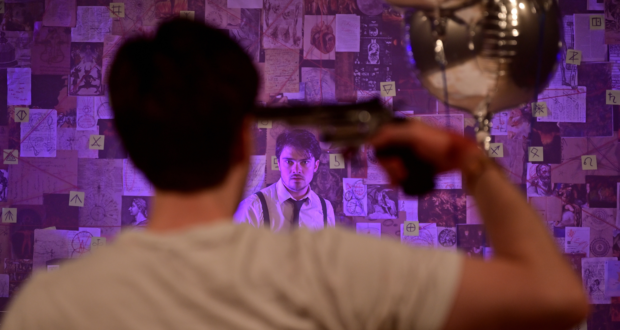An energetic, sometimes grotesque, demonic and often raucous reinterpretation of Marlowe’s classic Dr Faustus. Despite a strong start, it is in need of a good edit in order to achieve its goal of interacting with contemporary audiences in a meaningful way.Summary
Rating
Ok
‘A Faustian pact’ is a well-known phrase, and most people know it suggests an uneasy agreement with the Devil. There’s a similarly uneasy balance between the original play of Dr Faustus, written in the late 1580s by Christopher Marlowe, and the version now showing at the Southwark Playhouse. Produced by the Lazarus Theatre Company, it is an energetic, sometimes grotesque, demonic and often raucous reinterpretation of the tale, whose aim is to reimagine this classic for a contemporary audience.
The performance opens with Jamie O’Neill proclaiming that Faustus is gone. Charismatic and charming, he sits in his study considering the volumes of scholarly material that Faustus was bored with before turning to the magic arts that pre-empted his seduction by the devil. O’Neill is the star performer throughout, and here he interacts with the audience seamlessly, making eye contact and often generating laughter. It’s a strong start to the play; he communicates easily in the Elizabethan vernacular, generating a relationship with the audience, which encourages it to stay with him throughout his metamorphoses.
Hamish Somers then appears as the Good Angel, clad in grubby off-white underwear, alongside Rachel Kelly as the Evil Angel. They both vie with O’Neill (who is now Faustus) for his loyalty. At points both are connected with Faustus but then their concentration slips and it feels like they are staring into space. At this moment Faustus cleverly uses the set to conjure a devil and David Angland bursts on to the scene as Mephistopheles. Symbolically dressed in a banker’s suit with braces, he is a strong performer: enigmatic, remorseless and powerful.
Sadly, it all starts to go downhill from here. What then follows is a series of skits or parodies, which reflect the events in the original tale. All are unique in their retelling, often musical and incorporating dance. Sometimes they are entertaining but always too long and self-indulgent. The calibre of acting and the vocal capability shown by the cast is mixed to say the least.
I appreciate that the best, most innovative, theatre should play with form and make audiences think and even shock. Indeed the audience at this performance seemed appreciative at the end but many were personal contacts of the cast. However, I walked away puzzled as to how much of the original tale and its moral questions had been explored rather than exploited.
On a positive, set designer Sorcha Corcoran has created an intricate back wall combined of pictures and drawings representing the multiplicity of dilemmas between good and evil, Christianity and the devil. A simple black curtain is drawn back and forth to allow the chorus to come on and off stage and partition space. A small model of an orrery sits at the edge of the stage, gently revolving throughout the first half of the play, and representing the inevitability of the planets’ motion, regardless of human interaction. This set is clever and nuanced with subtle touches that complement the action.
As we approach the end of the tale and the time before Faustus must submit to Lucifer, body and soul, a cacophony of alarm clocks starts to screech the impending hour. It is genuinely horrific and one of the few scenes where a shocking and gruesome act is justified.
This production clearly has intent, but needs a good edit to achieve its goal of reaching diverse audiences in a meaningful way.
Written by: Christopher Marlowe
Adapted and Directed by: Ricky Dukes
Produced by: Lazarus Theatre Company
Designed by: Sorcha Corcoran
Lighting Design by: Stuart Glover
Sound Design by: Sam Glossop
Costume Design: Reuben Speed
Music by: Bobby Locke
Doctor Faustus plays at Southwark Playhouse until 01 October. Further information and bookings can be found here.
 Everything Theatre Reviews, interviews and news for theatre lovers, London and beyond
Everything Theatre Reviews, interviews and news for theatre lovers, London and beyond



